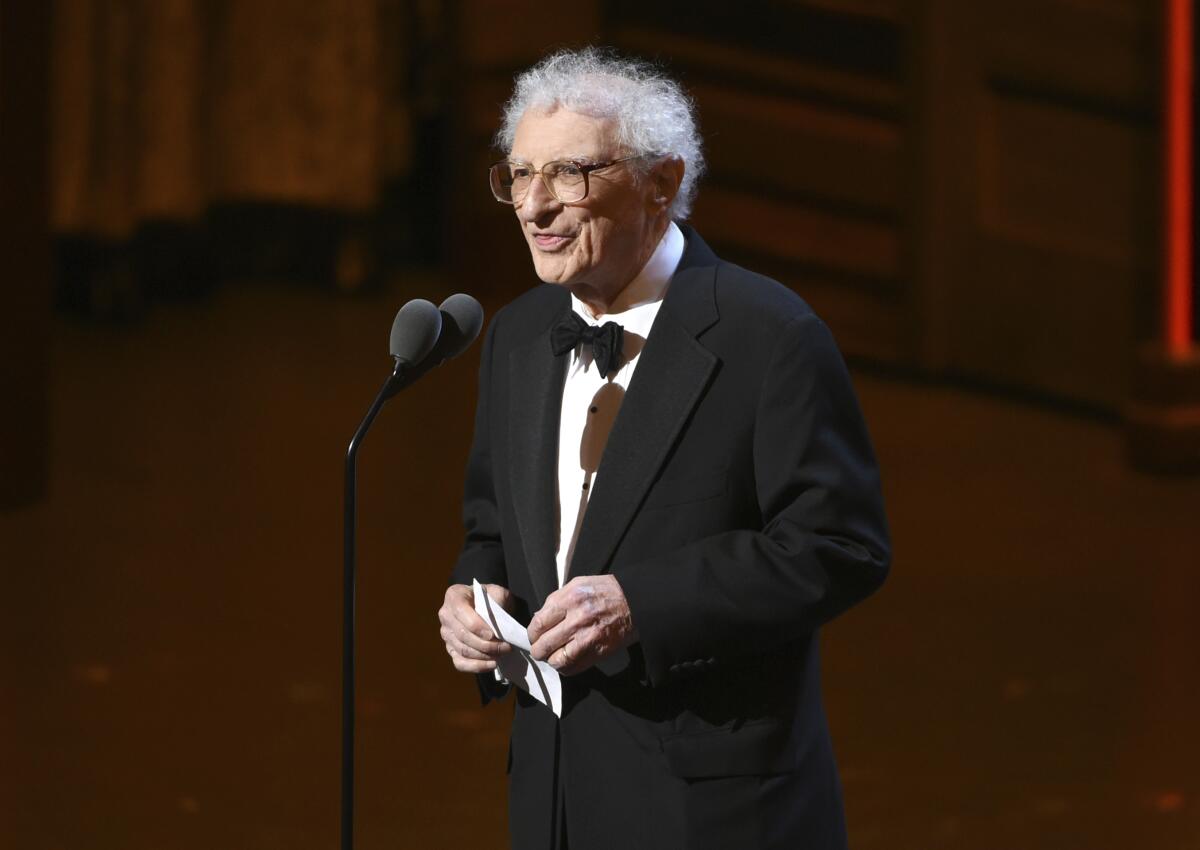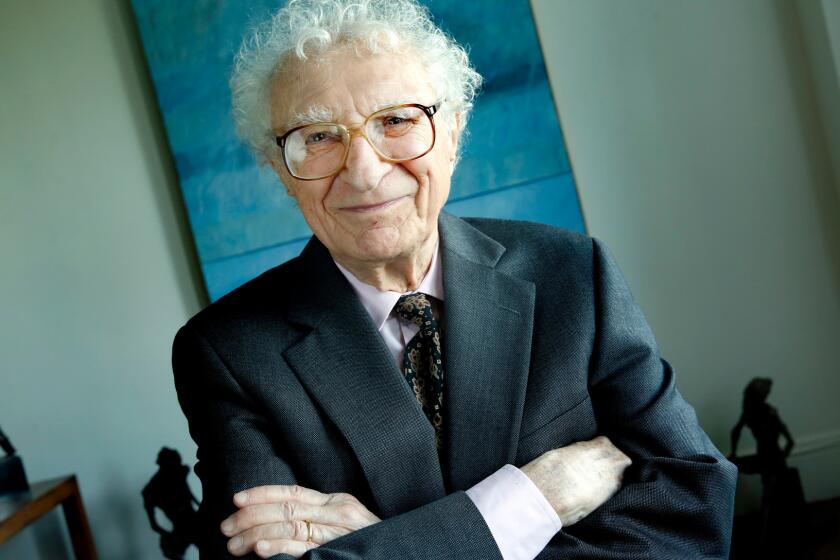Tony-winning lyricist Sheldon Harnick, co-creator of ‘Fiddler on the Roof,’ dies at 99

- Share via
NEW YORK — Tony- and Grammy Award-winning lyricist Sheldon Harnick, who with composer Jerry Bock made up the premier musical-theater songwriting duo of the 1950s and ’60s with shows such as “Fiddler on the Roof,” “Fiorello!” and “The Apple Tree,” has died. He was 99.
Known for his wry, subtle humor and deft wordplay, Harnick died in his sleep Friday in New York City of natural causes, said Sean Katz, Harnick’s publicist.
Broadway artists paid their respects on social media, with “Schmigadoon!” writer Cinco Paul calling him “one of the all-time great musical theater lyricists” and actor Jackie Hoffman lovingly writing: “Like all brilliant persnickety lyricists he was a pain in the tuchus.”
Bock and Harnick first hit success for the music and lyrics to “Fiorello!,” which earned them each Tonys and a rare Pulitzer Prize in 1960. In addition, Harnick was nominated for Tonys in 1967 for “The Apple Tree,” in 1971 for “The Rothschilds” and in 1994 for “Cyrano — The Musical.” But their masterpiece was “Fiddler on the Roof.”
Bock and Harnick were first introduced at a restaurant by actor Jack Cassidy after the opening-night performance of “Shangri-La,” a musical in which Harnick had helped with the lyrics. The first Harnick-Bock musical was “The Body Beautiful” in 1958.
“I think in all of the years that we worked together, I only remember one or two arguments — and those were at the beginning of the collaboration when we were still feeling each other out,” Harnick, who collaborated with Bock for 13 years, recalled in an interview with the Associated Press in 2010. “Once we got past that, he was wonderful to work with.”
They would form one of the most influential partnerships in Broadway history. Producers Robert E. Griffith and Hal Prince had liked the songs from “The Body Beautiful,” and they contracted Bock and Harnick to write the score for their next production, “Fiorello!,” a musical about Fiorello La Guardia, the reformist mayor of New York City.
Bock and Harnick then collaborated on “Tenderloin” in 1960 and “She Loves Me” three years later. Neither was a hit — although “She Loves Me” won a Grammy for best score from a cast album — but their next one was a monster that continues to be performed worldwide: “Fiddler on the Roof.” It earned two Tony Awards in 1965.
Broadway has been good to Pulitzer Prize-winning lyricist Sheldon Harnick.
Based on stories by Sholom Aleichem that were adapted into a libretto by Joseph Stein, “Fiddler” dealt with the experience of Eastern European Orthodox Jews in the Russian village of Anatevka in the year 1905. It starred Zero Mostel as Teyve, had an almost eight-year run and offered the world such stunning songs as “Sunrise, Sunset,” “If I Were a Rich Man” and “Matchmaker, Matchmaker.” The most recent Broadway revival starred Danny Burstein as Tevye and earned a best revival Tony nomination.
In a masterpiece of laughter and tenderness, Harnick’s lyrics were poignant and honest, as when the hero Tevye sings, “Lord who made the lion and the lamb / You decreed I should be what I am / Would it spoil some vast eternal plan / If I were a wealthy man?”
Bock and Harnick next wrote the book as well as the score for “The Apple Tree” in 1966, and the score for “The Rothschilds,” with a book by Sherman Yellen, in 1970. It was the last collaboration between the two: Bock decided that the time had come for him to be his own lyricist and he put out two experimental albums in the early 1970s.
Harnick went on to collaborate with Michel Legrand on “The Umbrellas of Cherbourg” in 1979 and a musical of “A Christmas Carol” in 1981; Mary Rodgers on a version of “Pinocchio” in 1973; Arnold Black on a musical of “The Phantom Tollbooth”; and Richard Rodgers on the score to “Rex” in 1976, a Broadway musical about Henry VIII.
He also wrote lyrics for the song “William Wants a Doll” for Marlo Thomas’ TV special “Free to Be ... You and Me” and several original opera librettos, including “Captain Jinks of the Horse Marines” and “Love in Two Countries.” He won a Grammy for writing the libretto for “The Merry Widow,” featuring Beverly Sills.
His work for television and film included songs for the HBO animated film “The Tale of Peter Rabbit” in 1991 with music by Stephen Lawrence, as well as lyrics for the opening number of the 1988 Academy Awards telecast. He wrote the theme songs for two films, both with music by Cy Coleman: “The Heartbreak Kid” in 1972 and “Blame it on Rio” in 1984.
More than 30 years ago, I went to Philadelphia to talk with the editors of the Saturday Evening Post, for whom I was then working out of Chicago.
In 2014, off-Broadway’s the York Theatre Company revived some of Harnick’s early works, including “Malpractice Makes Perfect,” “Dragons” and “Tenderloin.” “She Loves Me” was last revived on Broadway in 2016 in a Tony-nominated show starring Zachary Levi.
Harnick was born and raised in Chicago and earned a bachelor’s degree in music from the Northwestern University School of Music after serving in the Army during World War II. Trained in the violin, he decided to try his luck as a songwriter in New York.
His early songs included “The Ballad of the Shape of Things,” later recorded by the Kingston Trio, and the Cole Porter spoof “Boston Beguine,” from the revue “New Faces of 1952.”
He and his wife, artist Margery Gray Harnick, had two children, Beth and Matthew, and four grandchildren. Harnick had an earlier marriage to actress Elaine May. He was a longtime member of the Dramatists Guild and Songwriters Guild.
More to Read
Start your day right
Sign up for Essential California for the L.A. Times biggest news, features and recommendations in your inbox six days a week.
You may occasionally receive promotional content from the Los Angeles Times.








